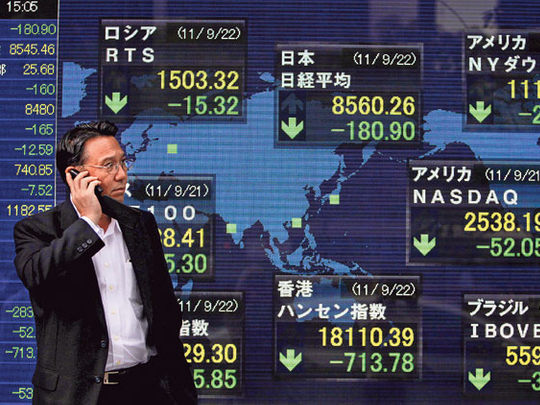
Dubai: World stocks plunged on Thursday on continuing economic uncertainty and fears of a double-dip recession.
Asian markets crashed with India's sensitive index Sensex nose-diving 704 points (4.13 per cent) at close, and Dow Jones and FTSE 100 extended massive losses amid warnings about the Greek-Eurozone crisis and the failure of the US Federal Reserve to restore confidence with a $400 billion (Dh1.47 trillion) boost to the economy. The Dubai market was slightly down and Abu Dhabi was flat on the day.
Stocks closed sharply lower after investors sold stocks with abandon, convinced that the US and the world are headed for a new recession. The Dow Jones industrial average fell as much as 527 points, the second consecutive rout since the Federal Reserve announced a change in strategy for fighting the economic slowdown.
At the close of trading, the Dow was down 391.01 points, or 3.5 per cent, at 10,733.83. The Standard & Poor's 500 index fell 37.18, or 3.2 per cent, to 1,129.58. The Nasdaq composite fell 82.52, or 3.3 per cent, to 2,455.67.
Although markets have been volatile for weeks, economists told Gulf News last night that the spectre of a double-dip recession was more alive than ever.
"We've forecast a 50 per cent chance of a recession over the next 12 months and I'd say it's probably more like 60 to 70 per cent now," said Gary Dugan, chief economist at Emirates NBD.
Europe outlook worse
"We're going to see more companies delaying announcements and job openings and those companies are going to start losing staff. They remember what happened in 2007 to 2009 and now they're saying we've got to batten down the hatches."
Simon Williams, chief economist at HSBC, agreed that the outlook was bleak.
"The financial markets are telling you that the European outlook is significantly worse then they had anticipated just a few days, let alone weeks ago," he said.
Williams said that although world leaders were due to meet over the weekend at the Group of 20 economically significant countries (G20), he was sceptical that it would serve to reduce the market declines.
"I would be surprised if anything of substance comes out of it," he said. "There are relatively few policy options still available to them."
On Wednesday, the Fed said a complete economic recovery was still years away, adding that the US economy has "significant downside risks to the economic outlook, including strains in global financial markets."











